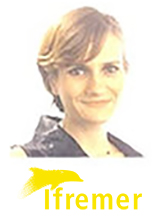
Q&A with the Goldschmidt Non-academic Careers Forum Panellists: Anne Trinquier and Katja Amstätter
As an introduction to the upcoming events for early career scientists at Goldschmidt2019 in Barcelona in August, last month on the EAG blogosphere we talked to Goldschmidt panellist Lewis Collins, Editor-in-Chief of the journal One Earth, about his career in scientific publishing. In this next post in the series, Anne Trinquier and Katja Amstätter talk about their careers in the fields of R&D and consultancy.
If you are attending Goldschmidt2019 and would like to find out more about working in these fields, register now for one of the lunchtime non-academic careers forums. Anne will be taking part in the R&D-related careers forum on Monday 19 August and Katja will be discussing consultancy-related careers on Thursday 22 August.
Anne Trinquier

What is your job?
I am presently an MC-ICPMS lab manager at Ifremer, namely an engineer in charge of maintaining the performance of a MC-ICPMS instrument and preparing this instrument for research analyses. Some of my time is also devoted to my own research and to the co-supervision of students.
How did you get your job?
My career has been a sequence of academic positions (about 8 years after my PhD) interspersed with a 5-year incursion in industry. I applied for the permanent position of MC-ICPMS lab manager at Ifremer, in Bretagne, France, in late 2017.
Did you initially plan on this career at the onset of your PhD?
Not precisely. I gave myself a period of about 10 years after my Masters to find a position as a researcher in academia. Given the limited number of permanent positions available and my taste for developing innovative analytical protocols, including measurement schemes involving prototypes, I accepted a permanent position as a TIMS and MC-ICPMS Applications Specialist for Thermo Fisher Scientific (Bremen, Germany). After 4 years, I applied for a short-term position at ETH Zürich to develop analytical protocols on a new TIMS prototype with a rare type of technology (a cavity source TIMS). It was during this time, and based on my combined experience as a researcher and engineer, that I applied for my current position at Ifremer.
What advice do you have for PhD students who are thinking of leaving academia?
Seek out working environments where you are encouraged to run the instruments yourself in order to optimize your analytical skills and your chances of finding a position, be it in industry or in another field of research. Thanks to my expertise on diverse mass spectrometers, although I initially trained as a cosmochemist I am now working in a Marine Geoscience institute.
Katja Amstätter
What is your job?
Senior Consultant for environmental chemistry at CDM Smith Consult GmbH, Germany. I’m working mainly on, though am not restricted to, remediation or waste projects, and for a short time now I have been responsible for organizing knowledge transfer within our European Unit.
How did you get your job?
Via an unsolicited application and two job interviews.
Did you initially plan on this career at the onset of your PhD?
I always had the option in my mind to leave science and academia, but throughout my studies and PhD time, science was just too exciting to turn my back on. However, the postdoc I undertook after finishing my PhD was an opportunity to apply theoretical knowledge not only in the lab but also in the field, and, with the type of projects involved, was a transition point to consulting. Finally, there were several points that allowed me to compare required skills in science and personal plans, which finally made me choose a non-scientific career.
What advice do you have for PhD students who are thinking of leaving academia?
It is smart to get to know possible fields of work and companies in the targeted market by undertaking internships or through connections with alumni, but it can also work without this bonus, at least in my case it did. One should take the initiative to become visible to potential employers. In my opinion, it is important to find your own way, follow your interests and remain true to yourself, at any stage of your education or career. Leaving science is usually a fundamental personal decision, involving also a certain kind of lifestyle, and both ways offer pros and cons which need to be thought through before choosing which path to take.
Interviews carried out by the EAG Communications Committee.

